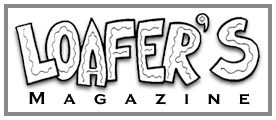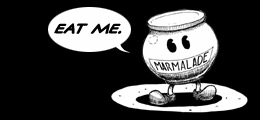Dinner
for Four: An Evening at the French Laundry
Peter Schilling Jr.
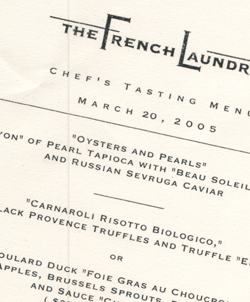 If
you read anything about the world of haute cuisine—as
Janice and I do—you will eventually come
across the name of The
French Laundry restaurant. For those of you
not in the know, The French Laundry is either
the best, or one of the best, restaurants in the
entire United States. Its head chef, Thomas Keller,
has been the subject of a few books and countless
magazine profiles, and his own pair of cookbooks
are eye-popping, twenty pound coffee table tomes
that make you either salivate or roll your eyes
at the ostentatious nature of gourmet dining.
Chefs and food critics alike drool as they search
for words to express their pleasure at his cuisine.
Being food snobs, we've tried to get a table with
every visit to our friends in San Francisco. But
thanks to its reputation, the French Laundry has
a two-month waiting list to get in, and even then
it is nearly impossible for the layperson—that
is, you or I—to get a seat. If
you read anything about the world of haute cuisine—as
Janice and I do—you will eventually come
across the name of The
French Laundry restaurant. For those of you
not in the know, The French Laundry is either
the best, or one of the best, restaurants in the
entire United States. Its head chef, Thomas Keller,
has been the subject of a few books and countless
magazine profiles, and his own pair of cookbooks
are eye-popping, twenty pound coffee table tomes
that make you either salivate or roll your eyes
at the ostentatious nature of gourmet dining.
Chefs and food critics alike drool as they search
for words to express their pleasure at his cuisine.
Being food snobs, we've tried to get a table with
every visit to our friends in San Francisco. But
thanks to its reputation, the French Laundry has
a two-month waiting list to get in, and even then
it is nearly impossible for the layperson—that
is, you or I—to get a seat.
This year, we got in. In January, Andy worked
some of his reckless magic, giving away his credit
card to a perfect stranger to secure a reservation
and hopefully not a case of identity theft. In
the weeks prior, both Janice and I were giddy,
cautious, and guilty over the thought of eating
at this place. As I gazed over the lavish French
Laundry Cookbook, I knew, deep down, that there
was not a chance in hell that I was going to survive
between now and our dinner date. Certainly, I
was going to get killed in a bizarre work accident,
or die on the plane, either from a crash or choking
on a peanut-free snack. There was also the growing
unease of how we were going to present ourselves.
What does one wear to the French Laundry? Do you
talk loudly, or whisper? Sneeze into your napkin
or hand? Of one thing I was certain: there was
no way on earth I would get to the French Laundry,
and if I did, I was certain to embarrass myself.
On Friday, the day of our flight, a blizzard
hit Minnesota, a snowstorm that our friend Wade
promised, not two days before, would be a "deal-breaker"—as
in, it was going to be so profound as to break
the deal of our vacation. At first arrival at
the airport, after fighting traffic for nearly
an hour, we made it to our gate just in time to
hear that our flight was cancelled. Passengers
were racing through the airport, shouting, cursing,
drinking, and collapsing in a heap by telephones,
desperately trying to make new reservations. The
next possible flight to San Francisco would be
on Sunday afternoon. Since the French Laundry
beckoned early Sunday evening, that didn't
bode well for us. I found myself sitting on the
floor myself, beneath a telephone, trying to keep
my frustrations in check. Surrounding me were
the usual bitchy businesspeople, believing that
the world revolved around them, yelling into the
telephone in the hopes that they would intimidate
Northwest's agents into changing the weather.
Across from me sat a mother trying to keep her
two very well behaved children occupied for what
would be a long night. Since everything was relative,
I thought, "well, I guess I'll have
to just figure it out, or we won't go."
So I booked us a midnight flight to Sacramento,
only an hour from our friends. On the flight,
a lens dropped from my glasses, keeping me from
my book, and then the airline lost our luggage
with our dress clothes inside. But we made it
to California, got our luggage at 3am Sunday morning,
and made our way later that day to Yountville,
home of the French Laundry. Needless to say, I
didn't die.
Yountville is a strange place. It is located
a good hour or so from the city, in the heart
of wine country. On the way I fell asleep, a deep
sleep, and woke in Yountville as we passed a small
vineyard in the center of town, three acres to
show off to the world. The
Yountville Inn, where we were staying, was
a rock and mortar affair, beautiful, cozy, and
roasting, thanks to Andy's insistence on running
the gas fireplace. I walked out behind our room,
where a patio faced a muddy stream and an ivy
covered wall which separated us from a trailer
park.
I fell asleep again while Andy, Sherrod and Janice
took a walk to the Bouchon bakery and to double-check
the reservation. Though you couldn't tell
from looking at us, everyone was a bit butterflied.
Earlier that day we had inexplicably feasted on
a horror of a goose egg breakfast (a Berkeley
farmer's market selection that I would recommend
to no one) that left my stomach reeling. As our
reservation neared, and we dressed, Andy kept
after me that I didn't have a tie ("You're
not wearing a tie?" "I don't
need one." "I've got an extra
one for you right here." "I don't
need one." "You sure?" "I'm
sure."), and then we walked the half mile
to the restaurant.
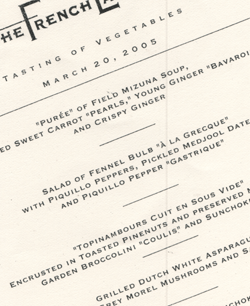 The
French Laundry is in a small, virtually anonymous,
two-story riverrock and timber building that used
to house a saloon, a brothel, a French laundry,
and now the French Laundry. There is
an air of quiet magnificence about the place,
a feeling that those who have made it in this
world—the powerful—have a place of
respite here. Which frightened me. On one hand
I told myself that in many ways this is the fruit
of success that many artists seek (and Thomas
Keller is certainly an artist), but it is also
the stomping ground for those jerks who are paid
more than they're worth, like stockbrokers, professional
athletes, and movie stars. Every word was spoken
just loudly enough to be heard. The room was cozy,
tastefully decorated, and lacking any of the usual
signage that greets you in a restaurant: none
of the credit card stickers in the window, the
requisite award plaques, and framed dollar bills.
Our maitre'd was a handsome young lady in a suit.
A sommelier arrived and offered Andy and I some
champagne. It tasted great, although I have no
clue as to what makes a good champagne, except
that it doesn't seem sour. This one tasted of
roses. I liked that. The
French Laundry is in a small, virtually anonymous,
two-story riverrock and timber building that used
to house a saloon, a brothel, a French laundry,
and now the French Laundry. There is
an air of quiet magnificence about the place,
a feeling that those who have made it in this
world—the powerful—have a place of
respite here. Which frightened me. On one hand
I told myself that in many ways this is the fruit
of success that many artists seek (and Thomas
Keller is certainly an artist), but it is also
the stomping ground for those jerks who are paid
more than they're worth, like stockbrokers, professional
athletes, and movie stars. Every word was spoken
just loudly enough to be heard. The room was cozy,
tastefully decorated, and lacking any of the usual
signage that greets you in a restaurant: none
of the credit card stickers in the window, the
requisite award plaques, and framed dollar bills.
Our maitre'd was a handsome young lady in a suit.
A sommelier arrived and offered Andy and I some
champagne. It tasted great, although I have no
clue as to what makes a good champagne, except
that it doesn't seem sour. This one tasted of
roses. I liked that.
While we waited, I asked to use the restroom.
A sexy young girl in a man's suit led me
to the upstairs bathroom, opened the door for
me, and then smiled with a look that seemed to
say "Would you like me to join you?"
But she didn't ask and I didn't ask;
it was just a smile. I was enjoying myself already.
Our headwaiter was a quiet gent, perfectly manicured,
with soft features, a smooth-as-caviar voice,
and hands big enough to pop open a champagne bottle
without wincing. I would have understood if he
had been an eye-rolling snob who felt that we
were out of our league. But he wasn't, even
though we were way out of our league. Rather,
he took his time explaining each menu item, flexing
his knowledge but never bludgeoning us with it,
and offering suggestions (the Chef's tasting
menu for the carnivores, definitely). After his
explanations, he ushered the eager sommelier our
way. This young fellow was very friendly and put
us at ease… he put me at ease, anyway. I
have a bizarre sensation when I'm being
served, either by salespeople or soft-speaking
waiters, and it feels as if someone's injected
morphine into my brainstem. My whole body relaxes,
and there's almost a post-coital softness
to my entire being. A perfect feeling for a dinner
such as this.
By now the place was slowly filling up. Behind
us, a group of four exchanged gifts and had their
photo taken by the waiter (prompting us to do
the same), and then a cute young couple sat elbow-to-elbow
and were congratulated on something by their waiter.
Our first course was a puff-cheese pastry that
epitomized the term "melt in your mouth",
and helped keep me glued to my seat—the
champagne was going to my head, making me feel
like floating away. It seemed to be going to everyone's
head, even those who hadn't touched a drop.
We were laughing pretty loud, making some lewd
jokes. Next came the restaurant's famous
cornets, little savory ice cream cones filled
with salmon tartare or, in Janice's case,
a vegetarian hash of eggplant caviar and sun dried
tomatoes. We scarfed them down and I swear it
was like doing drugs—nitrous oxide, perhaps—the
pleasure was so acute (and shortlived). Sherrod
loved it, even after having read about these in
the cookbook (where Keller describes his inspiration
was the cones at a Baskin-Robbins), making a face,
and saying, "I'd rather have ice cream
than raw salmon." Then again, she was pregnant
with triplets.
The cavalcade rolled on. The carnivores enjoyed
"Pearls and Oysters": hearts of the
bivalve resting on stock-infused tapioca, with
a headstone of caviar, all of which we downed
with a mother-of-pearl spoon (for silver can react
to the caviar, don'tcha know). Next, Andy
was brought his foie gras and Sherrod and I had
a risotto with shaved truffles and a white-truffle
milk broth. Each dish was served by a corps of
waiters, one for each of us. Our headwaiter brought
the truffles, in a lined walnut box, which, when
opened, seemed to contain a pile of turds. Of
course, these were the truffles, which were shaved
over the risotto. Again, there was the melt in
your mouth effect, the morphine in the nervous
system, and I tried my best to resist wolfing
down my meal (as is my wont). My poor, inarticulate
tongue was doing its best to understand the flavors.
Next came the olive oil poached red snapper.
Sherrod said, "Admit it, dude, this one's
a disaster." Andy didn't like it much
either. But I enjoyed it: a light fish, vinegary,
a palate-cleanser after all that rich baby cow
broth had coated my tongue. Those who felt otherwise
somehow managed to finish this, their fifth course.
By now, Janice had already been orgasming to
her own feast. Watching her pleasure at each dish
(it wasn't subtle) almost gave me an erection.
And it made me understand the strength of being
a pure vegetarian, as she is. When the chef (not
Keller that day—by now he's handed
the reins to his followers) can reach the heights
that she did with plates of fennel bulb, white
asparagus, or pureed mizuna (whatever that is),
it is a little masterpiece every time. Meat sees
you halfway: I could have deep fried that fish
until was the consistency of a baseball glove,
and would have downed it gladly. Vegetables are
not so fortunate.
And Janice's next dish was the topper.
As the carnivores were served our main dish, Janice
was given a plate with nothing more than a pair
of roasted globe artichokes. Next, a handsome
young waiter with dark hair, equally dark eyes,
and a rugged face that seemed aged by a childhood
in the moors, leaned in carrying a beautiful ceramic
tureen. He knelt beside her and whispered about
the pleasures of the vegetables he was slowly
ladling onto her plate, culminating in spoonfuls
of broth. No mere food, this.
At this point we were all beginning to feel a
bit daffy. Andy had, by then, put away a tremendous
amount of wine, but even without the spirits we
were all on sensory overload. With the conclusion
of the lamb course, we were all staring with great
disappointment at the tiny slivers of meat still
clinging to the bone, wishing that we could take
these in our paws and start gnawing away, growling
perhaps. We were telling lewd jokes much louder
than before, nearly rolling on the floor. Adding
to this effect was the power party at the table
next to us. This was a group of middle-aged men,
one of whom was some sort of retired sports star.
They knew this place inside and out, spoke with
hushed and forceful tones, and seemed to hold
the world on a string. It was all I could do to
keep from belching or trying to get a rise out
of them.
Dinner over, it was time to begin the four course
dessert, which began with cheese. On my plate
were three little triangles of cheese and some
stewed fruit. Cappuccino for me, some dessert
wine for Andy. Then a banana sorbet on a cookie.
Then a chocolate mousse and a hazelnut strudel.
At this point, Janice had a white chocolate something
or other, a "Granite", with a passionfruit
sauce and caramelized olive pieces. Yes, olive
pieces. I liked it; the rest found it strange.
We all agreed the sauce looked like goose jism.
Don't ask how we came to that conclusion.
Ah, but there was a secret dessert course sandwiched
in between the goose jism and the final cookie
tray. A pot of vanilla pudding for the men, and
a crème brulee for the women. We switched.
I ate my crème brulee and ignored all the
cookies, for if I had taken one more bite, that
sexy young woman in men's clothes would
have had to lead me to the restroom to vomit.
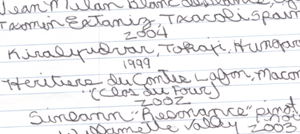 Originally,
I wanted to buy a bottle of wine to drink after
dinner in our little hotel room (which of course
had fine glassware—this is wine country,
after all). But by the time we stumbled out, enough
was enough. This whole evening had been somewhat
of a mystery to me, what I ate and what I drank,
strange and magnificent things that made me feel
stunned with life. I was in a mood to go home
and curl up by the fire and try to figure out
what the hell Wallace Stevens was all about. It
was a night like that—I could sense the
artistry in the meal, in the way that every piece
was cut the same size, the freshness of the ingredients,
the mastery of the broths and the dressings. In
my pocket was the little clothespin we'd stolen,
with the French Laundry stamped on it, and a notecard
from our waiter, with our wine selections on it.
This was wine that I will certainly never drink
again, not the least because I'm a beer drinker,
though mostly because they were too expensive. Originally,
I wanted to buy a bottle of wine to drink after
dinner in our little hotel room (which of course
had fine glassware—this is wine country,
after all). But by the time we stumbled out, enough
was enough. This whole evening had been somewhat
of a mystery to me, what I ate and what I drank,
strange and magnificent things that made me feel
stunned with life. I was in a mood to go home
and curl up by the fire and try to figure out
what the hell Wallace Stevens was all about. It
was a night like that—I could sense the
artistry in the meal, in the way that every piece
was cut the same size, the freshness of the ingredients,
the mastery of the broths and the dressings. In
my pocket was the little clothespin we'd stolen,
with the French Laundry stamped on it, and a notecard
from our waiter, with our wine selections on it.
This was wine that I will certainly never drink
again, not the least because I'm a beer drinker,
though mostly because they were too expensive.
Back in our hotel room, we lay on our beds, laughing,
making jokes about how pricey our next bowel movements
were going to be, and sucking bits of caviar out
of our teeth. We watched some "Animal Planet",
and then, one by one, the others fell asleep,
especially Sherrod, whose snoring kept me awake.
After tossing around on my full belly for a half
an hour, I decided to take a walk. The night was
warm and wet, and I wandered the streets of Yountville.
I thought that this is a bizarre age we live in,
when a teacher and a struggling writer who puts
in a few hours at a Home Depot can dine at the
finest restaurant in the land. I stopped to read
the bus schedule outside the entrance to the trailer
park, the bus that no doubt ferries the help in
to clean our dishes and make our beds as we traipse
around wine country.
Yountville, at one time, held a swarm of low-lifes,
blue collar workers, truckers, etc. At one time,
people enjoyed or were abused in the various brothels,
greasy spoons and dime bars. I don't think
it's necessarily bad that the town has changed.
But I do want to remember what it once was, and
what it might be again. As I walked the rain-drenched
street, I wondered what it was exactly I was feeling
at that moment. Triumph? Guilt? What did I want
exactly? Maybe I want to be able to access the
opulence, then feel better by criticizing it,
and somehow purify myself in the process.
So I came back to the hotel room, found my book
but not my journal, and sat in the breakfast room
of our hotel, scribbling this piece in the front
papers. I came back, took a bath, and fell asleep.
The next morning, we woke late, dressed, and said
goodbye to Yountville forever.

|
